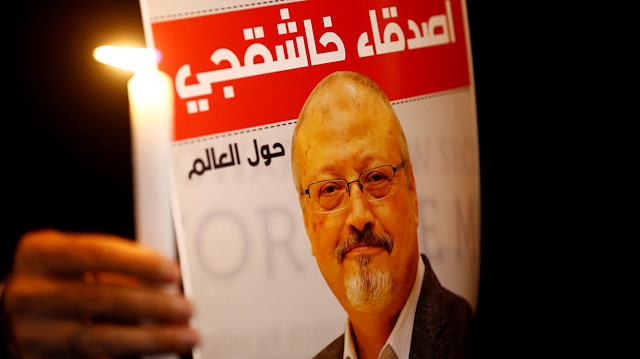

A demonstrator holds a poster with a picture of Saudi journalist Jamal Khashoggi
Scenario presented by Saudi prosecutor last Thursday appears to be deficient and does not clear up crime
Remarks by the Saudi Chief Prosecutor’s Office on last month’s killing of journalist Jamal Khashoggi present an unbelievable scenario and leave some questions unanswered, an analysis of the statement shows.
The Saudi office’s announcement on Thursday that it had charged 11 out of 21 suspects in relation to the Oct. 2 killing of Khashoggi at the Saudi Consulate in Istanbul was deficient and satisfied neither Turkey nor the international community.
Turkey is "unsatisfied" by the prosecutors’ statements, said Turkish Foreign Minister Mevlut Cavusoglu.
After Khashoggi disappeared, camera footage and other evidence revealed that a 15-member hit squad came from Saudi Arabia to Turkey on the same day as the killing.
Now Saudi prosecutors have indicted 11 people over the killing, including five for whom it has recommended the death penalty for ordering and committing the killing.
According to the Saudi account, a team of negotiators at the consulate was unable to persuade Khashoggi to return to the kingdom, so they used a poisonous injection to kill him, and then dismembered the body.
Under this account, while the intelligence officers waited on the sidelines, the negotiators did the actual killing, which requires professional skills and tools, one of the points that makes it unbelievable.
Apparently the Saudis are pushing this unlikely scenario in order to clear the name of Ahmed al-Assiri, a former Saudi deputy head of intelligence. If they succeed, it will strengthen the claim that the incident took place independently of Saudi Crown Prince Mohammed bin Salman.
The fact that Khashoggi was killed within minutes after he entered the consulate is more proof that the hit squad did not take part in any negotiations.
All this suggest that the members of the 15-member hit squad the Saudi prosecutors paint as negotiators were actually executioners.
- Forensics expert on 15-member Saudi team
Shaalan al-Shaalan, the Saudi deputy public prosecutor, said an operation was ordered to either persuade or force Khashoggi to return to Saudi Arabia.
Al-Assiri, a former deputy head of intelligence, issued an order for Khashoggi’s return on Sept. 29, a day after the journalist first visited the consulate building to do paperwork for his marriage.
It was al-Assiri who put together the 15-member team, according to the prosecutor. He contacted a forensics expert to join it for the purpose of removing evidence from the scene should force have to be used.
The Saudi prosecutors are trying to present the killing as "a unilateral improvised decision" that was taken at the last minute, but bringing in this forensics expert from Riyadh indicates that the decision to kill Khashoggi was not taken in Istanbul but rather planned in Saudi Arabia.
- Local collaborator
The Saudi Prosecutors' Office said the 15-member team asked an unnamed local collaborator in Istanbul to find "a safe place" where they could keep Khashoggi if they had to take him to Saudi Arabia by force.
The Saudi team, however, did not check on or try to explore this safe place.
Moreover, the Saudi authorities failed to produce a sketch of the collaborator -- which they said they would share with the Turkey -- whom they even trusted to arrange a safe place if needed and to handle the remains of Khashoggi, which proves that the collaboration with Saudi authorities was not a sound one.
- Trial in Turkey
Turkey does not believe that involvement by the Turkish side in any Saudi trial process will help, as the suspects are not likely to give free and truthful testimony before a Saudi security and intelligence team.
Thus, Turkey wants the suspects to be tried in Turkey, where they committed the crime.
The Saudi chief prosecutor wants to come to Turkey again to give a sketch of the collaborator and request the evidence that Turkey has.
The names and duties of the 11 people accused by the Saudi side are not yet known.
If the Saudi chief prosecutor visits Turkey again, the Saudi side is expected to tell Turkey about these 11 people.
Khashoggi, a frequent contributor to The Washington Post, was killed on Oct. 2 inside the Saudi consulate in Istanbul.
After weeks of denying any involvement in the crime, Saudi Arabia admitted that Khashoggi had been killed inside the consulate but claimed the Saudi royal family had no prior knowledge of any plot to murder the journalist.
#Chief Prosecutor
#journalist Jamal Khashoggi
#murder
#Saudi Arabia
#scenario

